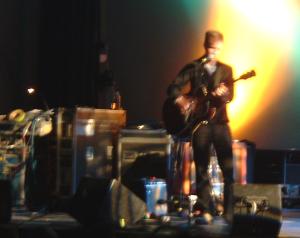BEST ALBUMS OF THE YEAR, #8
 2005's Warped Tour Alumni
2005's Warped Tour AlumniFall Out Boy
From Under The Cork Tree/
Motion City Soundtrack
Commit This To Memory/
Youth Group
Skeleton JarRight now, there's a substantial and heated argument transpiring on blogs and music threads throughout the Internet about the inclusion of six controversial hip-hop albums on Pitchfork Media's list of Top 50 Albums of 2005.
Could anything sound more uninteresting?
Well, no. White indie rock kids arguing over the merits of Cam'ron's latest record
Purple Haze would be like taking steakhouse recommendations from a lifelong vegetarian. But everyone has an opinion and none holds as much Internet validity as Pitchfork's. Undermining said validity would seem futile and silly as they've proven themselves in the past as tastemakers (see; Broken Social Scene, Arcade Fire, Clap Your Hands Say Yeah (who’s extreme success still baffles me), etc.). Admirably, Pitchfork could restrict itself to covering only indie rock but attempts to focus on all genres (I use the word "attempt" because their hip-hop coverage, for example, feels peripheral and superficial). Nevertheless, that's their claim and I applaud them for the efforts.
But on behalf of the two million American teens that bought Fall Out Boy's
From Under The Cork Tree I ask why all genres are valid and noteworthy with the exception of emo?
A couple weeks back, I was speaking to Brian
a good friend of mine who is also a writer for Pitchfork and I asked him thoughts about pitching an emo column for the website, like a monthly round-up of releases (like they currently do for house music, techno, etc.). Would editor-in-chief Ryan Schreiber be responsive to it? Brian said, absolutely not. Ryan hates the stuff.
It's unfortunate that one person could shift the editorial content of an influential outlet based simply on his preferential tastes and personal dislikes (how emo of him) especially in a year when emo produced three very strong releases by, coincidentally, all alumni of 2005's Vans' Warped Tour.
The first record and most popular is the aforementioned by Fall Out Boy. On the strength of both their two addictive singles "Sugar, We're Goin' Down" and "Dance, Dance" and the promotional push on MySpace.com, their second release was far from being a sophomore slump. In fact, no one could anticipate just how successful this record would become launching the once-obscure pop-rock band from Wilmette, Illinois into mainstream contenders. But ironic song titles aside ("I've Got A Dark Alley And A Bad Idea That Says You Should Shut Your Mouth (Summer Song)," "I Slept With Someone In Fall Out Boy And All I Got Was This Stupid Song Written About Me"),
From Under The Cork Tree is a simple, formulaic emo album with passionate and tuneful vocals, equally passionate and tuneful guitars and lyrics that are just as expressive and confessional as the lyrics you would find in an indie rock recording ("Why don't you show me the little bit of spine/
You've been saving for his mattress, love?"). I would suggest that some of them are even wittier. Their sound is no revelation but by placing "boy" in their band name, they've beat you to the critical punch.
Motion City Soundtrack (whatever happened to simple one-word band names?), the five-piece rock band from Minneapolis illustrates the more power pop side of emo. Their second record
Commit This To Memory feels more playful and confident than an emo band should sound. Incorporating the sheer hookiness of Weezer with the condensed manic energy of blink 182 (Mark Hoppus produced the album), MCS come closer to replicating the power-popping of the Posies and the Smoking Popes. Unfortunately, the stigma attached to their label Epitaph, noted for its punk and emo releases, would probably deter potential fans from committing to
Memory but after one listen to the single "Everything Is Alright," your hesitation would quickly dissipate.
The final consideration is Youth Group's
Skeleton Jar, which, in risk of being self-referential, I've already written about:
The Australian sensation Youth Group are virtual nobodies here and criminally, that hasn't changed despite an opening slot on Death Cab For Cutie's last tour. And what's even more disappointing is when considering that their sound, which is not completely unlike their past touring mates, is totally accessible. They are the sentimental hope to Death Cab's full-of-despair hopelessness. This optimistic and anthemic debut album shimmers with an unequaled production value, successfully replicating the moods of Leonard Cohen ("Piece of Wood"), Built To Spill ("Drowned), and James ("Baby Body," the best song I've heard about the paralyzing impact of a poor self-image). This debut is, simply put, lovely. Youth Group sounds like a band you could take home to your mother.
Ignoring these three releases based on an unjustifiable whim just seems silly, like ignoring a zeitgeist because it's too earnest (or whiney. Same thing). Hearts will always be worn out on their respective record sleeves and emo will exist whether Pitchfork assists in its continuous rise to a platueed presence or not. So, while the debate on whether white indie kids have a right to critique hip-hop or not continues, ultimately, I wonder if these critics had just been ten years younger (or perhaps more open-minded) would they be listening to Fall Out Boy...or Cam'ron?







